Statement by Mr.Dmitry Polyanskiy, Charge d'Affaires, at the Security Council on the situation in Yemen
We would like to thank Mr. Martin Griffiths, Mr. Mark Lowcock, Mr. David Beasley and Ms. Rasha Jarhum for their briefings.
We first want to note the reduction of violence around the Yemeni port of Al-Hudaydah. We believe it is essential to work to establish a full, countrywide cessation of hostilities, which is important not only to ensure the reliable delivery of humanitarian and commercial goods to the northern areas of Yemen where the majority of the country’s population lives, but also to achieve the successful implementation of the Special Envoy’s plans to hold a round of negotiations in Sweden.
We welcome the progress that Mr. Griffiths has made in getting the parties to resume a dialogue and show flexibility on confidence-building measures, including the exchange of prisoners and other steps. We hope the planned talks will be substantive and help to make the political process sustainable. We do not expect the disagreements to end quickly. Years of confrontation have created a gulf that will not be easy to bridge.
We will continue to assist Mr. Griffiths through bilateral channels, in our capacity as a permanent member of the Security Council and also a member of the group of 19 States supporting international efforts for a settlement in Yemen. Our position remains the same.
We continue to call for a plan for a negotiated solution to the conflict in Yemen. The parties must show restraint and refrain from resorting to force. The history of the Yemeni conflict shows that the military efforts are not working. Every day of war cranks up the cost of Yemen’s post-conflict reconstruction.
We condemn the indiscriminate strikes on civilian targets and ballistic-missile attacks on Yemen’s neighbours. We support ensuring unconditional compliance with the relevant provisions of international humanitarian law and unfettered humanitarian access to all parts of the country. The humanitarian situation in Yemen remains critical. A majority of the population is in need of assistance of one sort or another. Millions of Yemenis are starving and have no way of obtaining the medical services and medicines they need. We must make humanitarian assistance to Yemen a priority in our joint work and it must be provided on a non-discriminatory basis, regardless of who controls the territories where Yemenis live.
The international community is actively assisting the people of Yemen. While Russia is contributing to that effort, like many other Member States, we realize that it is impossible to improve the situation in Yemen through humanitarian measures alone. The solution must be a political one. We now need to unite around the Special Envoy and help him work proactively with all of the actors involved in the Yemeni conflict.
The war is only playing into the hands of the various terrorists who have been taking advantage of the chaos to strengthen their positions in central and southern Yemen. The fight against terrorism is our shared task and we must take every possible measure to end its threat.
In conclusion, we want to express the hope that policies of confrontation, threats and pressure through sanctions will give way to collective efforts to create regional dialogue mechanisms, as well as a comprehensive and indivisible security architecture in the Middle East, both for the Arab States of the Persian Gulf and their neighbours. Russia’s vision in that regard remains relevant and much needed.
